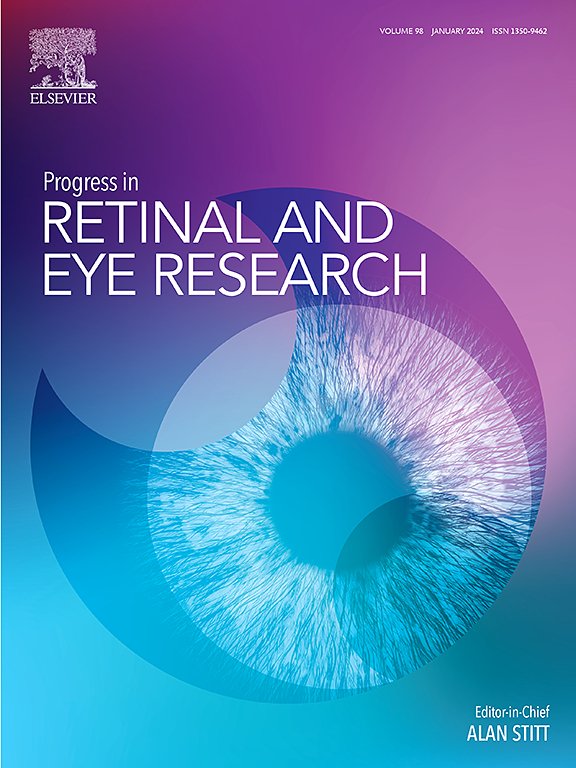Cellular component transfer between photoreceptor cells of the retina
IF 14.7
1区 医学
Q1 OPHTHALMOLOGY
引用次数: 0
Abstract
Photoreceptor transplantation is a potential therapeutic strategy for degenerative retinal diseases. Studies on mechanisms contributing to retinal regeneration and vision repair identified cellular components transfer (CCT) as playing a role, in addition to somatic augmentation (referred to as “cell replacement” in this paper). In CCT, donor photoreceptors shuttle proteins, RNA, and mitochondria to host photoreceptors through intercellular connections. The discovery of CCT in the transplantation context triggered a re-interpretation of prior transplantation studies that generally did not include specific CCT assays and thereby broadly emphasized the cell replacement model, reflecting the prevailing understanding of retinal transplantation biology at that time. In addition to clarifying our understanding of photoreceptor biology, CCT has raised the possibility of developing treatments to replenish molecular deficiencies in diseased photoreceptor cells. As the CCT field evolves, investigators have used diverse terminology, and implemented different CCT assays following transplantation in animal models. The non-standardized terminology of CCT and absent minimal assay standards for detection can hinder communication between investigators and comparison between studies. In this review, we discuss the current understanding of CCT, provide an overview of transplantation and regeneration studies in small and large animals, and propose terminology and a minimal assay standard for CCT. Further research on CCT may eventually provide new avenues to treat a range of hereditary and acquired retinopathies while illuminating mechanisms of cell-cell interaction in the retina.
视网膜感光细胞之间的细胞成分转移。
光感受器移植是一种潜在的视网膜退化性疾病治疗策略。对视网膜再生和视力修复机制的研究发现,除了体细胞增殖(本文中称为 "细胞替代")外,细胞成分转移(CCT)也发挥着作用。在CCT中,供体感光细胞通过细胞间连接将蛋白质、核糖核酸和线粒体穿梭到宿主感光细胞。CCT在移植中的发现引发了对之前移植研究的重新解读,之前的移植研究一般不包括特定的CCT检测,因此广泛强调细胞置换模型,这反映了当时对视网膜移植生物学的普遍理解。除了澄清我们对感光细胞生物学的认识外,CCT 还为开发治疗方法以补充病变感光细胞的分子缺陷提供了可能性。随着CCT领域的发展,研究人员使用了不同的术语,并在动物模型移植后实施了不同的CCT检测。CCT 术语的非标准化和缺乏最低检测标准会阻碍研究者之间的交流和研究之间的比较。在这篇综述中,我们讨论了目前对 CCT 的理解,概述了小动物和大动物的移植和再生研究,并提出了 CCT 的术语和最低检测标准。对CCT的进一步研究最终可能为治疗一系列遗传性和获得性视网膜病变提供新的途径,同时阐明视网膜中细胞-细胞相互作用的机制。
本文章由计算机程序翻译,如有差异,请以英文原文为准。
求助全文
约1分钟内获得全文
求助全文
来源期刊
CiteScore
34.10
自引率
5.10%
发文量
78
期刊介绍:
Progress in Retinal and Eye Research is a Reviews-only journal. By invitation, leading experts write on basic and clinical aspects of the eye in a style appealing to molecular biologists, neuroscientists and physiologists, as well as to vision researchers and ophthalmologists.
The journal covers all aspects of eye research, including topics pertaining to the retina and pigment epithelial layer, cornea, tears, lacrimal glands, aqueous humour, iris, ciliary body, trabeculum, lens, vitreous humour and diseases such as dry-eye, inflammation, keratoconus, corneal dystrophy, glaucoma and cataract.

 求助内容:
求助内容: 应助结果提醒方式:
应助结果提醒方式:


